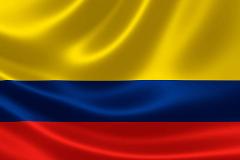
Colombian elite backed death squads, former paramilitary commander says
Article first published May 19, by the Guardian. Article by Luke Taylor in Bogotá
Salvatore Mancuso testified to peace tribunal that rightwing AUC worked hand in glove with business, military and political elite
A notorious former commander of Colombia’s largest paramilitary group has revealed new details of how right-wing death squads worked side by side with the country’s business, military and political elite to sow terror in the countryside and wipe out leftwing insurgencies.
Salvatore Mancuso told Colombia’s peace tribunal this week that state institutions were not only complicit in the expansion of the United Self-Defense Forces of Colombia (AUC) but actively coordinated with them, giving orders to wipe out anyone suspected of aligning with communist rebels.
“This phenomenon of paramilitarism came from the state,” Mancuso told the Special Jurisdiction for Peace (JEP) on a video link from the US where he was extradited on drugs charges in 2008.
Mancuso was released from prison in 2020 and is seeking a reduced sentence from Colombia’s transitional justice system in exchange for divulging the human rights atrocities committed by the AUC – a key player in a brutal, six-decade-long conflict which has left 450,000 dead and millions displaced.
The AUC formed in the Córdoba region in the north of the country to protect landowners from guerrillas but rapidly expanded into one of the world’s biggest drug cartels. Most of its 20,000 combatants laid down their weapons in 2004 as part of a controversial peace process.
Mancuso, who was the AUC’s second in command, has admitted to orchestrating thousands of crimes and some of the darkest chapters in Colombian conflict – including massacres of unarmed civilians, torture and sexual violence.
In sessions lasting up to eight hours the former warlord this week gave grisly accounts of how the militia acted as an arm of the Colombian state to silence the political opposition and take on the Revolutionary Armed Forces of Colombia (Farc) guerrillas.
Mancuso said officials gave the AUC lists of individuals and communities with suspected ties to the communist rebels so they could intimidate, torture and assassinate them without consideration for the rules of war.
“Mancuso’s narrative was that the military was not strong enough to combat the guerrillas themselves and needed an extrajudicial force in order to carry out the scorched-earth tactics that they themselves could not,” says Elizabeth Dickinson, senior analyst for Colombia at International Crisis Group.
There was “enormous pressure” from the state to wipe targets out, Mancuso said. Those targets include Gustavo Petro, then a leftwing congressman and now the country’s president.
Mancuso corroborated previous accusations that the army gave the order for another notorious killing, the 1998 assassination of Jaime Garzón, a beloved TV comedian and political activist.
“Anyone who was accused was eliminated. This is a pattern we learned hand in hand with the institutions of the state,” he said.
The AUC deeply infiltrated Colombian politics and in 2004 Mancuso was even invited to speak to congress to a standing ovation.
One of Mancuso’s most shocking new allegations was that the then president, Álvaro Uribe, removed the security unit for Eudaldo Díaz, a local mayor in the town of El Roble, so the AUC could torture and kill him in 2003.
Mancuso also alleged that Francisco Santos, then vice-president, requested that he form a new unit around Bogotá to prevent leftwing rebels from advancing on the capital.
Uribe and Santos have both denied Mancuso’s allegations.
Mancuso alleged that hundreds of businesses – including banana companies and multinationals such as Coca-Cola and Drummond – helped fund the AUC in the 1990s as it grew from a community of vigilantes into a national terror machine, while military generals trained and supplied the AUC commanders with helicopters and uniforms. Coca-Cola and Drummond have previously denied the allegations.
“Mancuso’s testimony confirms that paramilitarism was not only an anti-subversive strategy but an economic one to make business leaders rich, to elect corrupt politicians in the highest ranks of the state and to spy on and intimidate politicians, lawyers and journalists,” says Julián Martínez, author of Chuzadas, a book documenting how the Colombian state spied on judges, journalists and the political opposition.
The army often planned their offensives together with paramilitaries so they could quash guerrilla fronts in pincer manoeuvres, Mancuso said.
“The territories in guerrilla areas were emptied,” he said.
When the number of civilian casualties began to rack up Mancuso says the attorney general’s office alerted the AUC ahead of investigations so they could burn the bodies.
Experts say Mancuso’s accounts advance the JEP’s mission to untangle the truth of Colombia’s conflict and offer reparation to victims.
The warlord will now have 30 days to provide evidence to support his claims, which could spark new investigations into some of Colombia’s most powerful political figures.
Mancuso’s testimony is vital to understand not just the past but the present as rightwing drug-trafficking organisations such as the Gulf Clan, which was founded by former AUC members who refused to disarm and continues to terrorise the countryside, picking off community leaders who oppose them.
“These same acts continue to be committed today, not in the name of the United Self-Defense Forces, but of the Gulf Clan and they too have extensive links with the state,” Martínez says.
